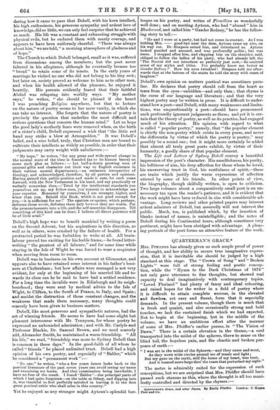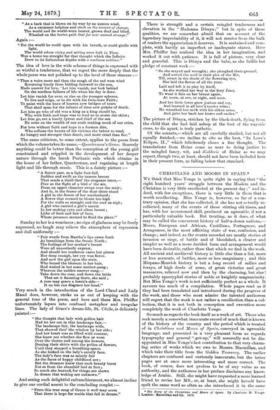QUARTERMAN'S GRACE.*
MRS. PFEIFFER has already given us such ample proof of power of thought, and her ability to secure true imaginative expres- sion, that it is inevitable she should be judged by a high
standard at this stage. The " Crown of Song " and " Broken Lights " were full of strong feeling and poetic concep- tion, while the "Hymn to the Dark Christmas of 1874" not only gave utterance to fine thoughts, but showed real capacity to deal imaginatively with contemporary topics. "Loved Florimel " had plenty of fancy and ideal colouring, and raised hopes for the writer in a field of poetry where it is difficult to attain complete success, in the elevated and flawless, yet easy and fluent, form that it especially demands. In the present volume, though there is much that is fresh and quaint, and also occasionally strong and bold touches, we lack the sustained finish which we had expected. Not to begin at the beginning, tout in the middle of the volume, we have an ambitious effort after the manner of some of Mrs. Pfeiffer's earlier poems, in " The Vision of Dawn." There is a certain elevation in the theme,—a soul transported into the midst of the spheres, there to muse on the blind toil, the hopeless pain, and the chaotic and broken pur- poses of earth :—
" I was set in the midst of the Spheres,—and they came and went, As they wove wide circles around me of music and light ; But my gaze on the earth, still the home of my heart, was bent, And it loomed more large thro' the tears that perturbed my eight."
The metre is admirably suited for the expression of such conceptions, but we are surprised that Mrs. Pfeiffer should have passed such stanzas as this, where the thought is all too mani- festly controlled and directed by the rhymes :—
Quartertnan'a Grace, and other Poems. By Emily Pfeiffer. London: C. Began Paul and Ca.
"As a bark that is blown on its way by an unseen wind, As a swimmer helpless and stark on the torrent of change, The world and its world-worn bearer, grown deaf and blind, Wheeled on the beaten path that for erer seemed strange."
Again :—
" For the world he could span with his breath, or could girdle with
light, The world whose rising and setting were both in. Time, Was a home too straight for that thought which the Infinite Drew to its fathomless depths with a madness sublime."
The idea of love in the wide scheme of things is expressed with .so wistful a tenderness, that we regret the more deeply that the whole poem was not polished up to the level of these stanzas :—
"Then a voice more sad than the sough of the sad west wind
Returning lonely from bidding farewell to the sun, Made answer for love, ' Let him vanish, nor look behind On the seedless fallows of life when his day is done.
Let him vanish for ever, or rise on the younger spheres, To live and reign, or to die with his twin-born Faith; To paint with the hues of heaven new bridges of tears That shall span for the infants of time new galphe of death.
Let him go who of old was a king as a king should be, Who with faith and hope was to lead ns to storm the skies ; Let him go, ere a lonely tyrant and thief of the sea He seize on the wealth of our souls making mock of our cries, For love without faith and hope is a foeman dire, Who softens the hearts of his victims the better to rend, As hungry and stronger than death, and more cruel than fire."
The same criticism, to some extent, applies to the poem from which the volume takes its name,—Quarterman's Grace. Scarcely anything could be better than the conception of the yotmg girl constrained and crippled in the development of her deeper nature through the harsh Puritanic rule which obtains in the house of her father, Quarterman, and regaining at length light and life through music. This is a dainty picture :— " A flutter past, as a light foot-fall,
Sudden and swift as the unseen breeze
That sends a thrill thro' the stagnant trees,—
Free as the flight of a bird o' the air, From an upper chamber swept over the stair ; And lo, in the frame of the door there stood A girl in the flower of her maidenhood ; A flower that seemed to bloom too high For the walls so straight and the roof so nigh; A girl who carried a girl's unrest In her seeking eyes and silent breast ; Lithe of limb and fair of face,
Whose presence seemed to flood the place."
Sunday to her is a weariness ; no sign of gladness may be freely expressed, no laugh may relieve the atmosphere of repression and dull uniformity :—
" Fair words from Martha's lips came forth As breathings from the. frozen North ; The feelings of her mother's breast Were all nnmotherly exprest, And should her tenderest cares but pierce Her deep enough, her cry was fierce. And now the girl upon the stair, Who bound the blossom in her hair, Had waked in her some mother-pang ; Whereon the sudden answer rang,— Take down the rose, and down the bride That set it flaunting there, she said ; A rose may grace a lassie's side—
It no but can disgrace her head."
Very much in the introduction of the Lord Claud and Lady Maud does, however, strike us as out of keeping with the general tone of the poem, and here and there Mrs. Pfeiffer • unfortunately lapses into confused metaphor and irregular lines. The lady of Grace's dream-life, St. Cecile, is delicately
-painted :— "She thought that lady with golden hair Had let her out in that landscape fair,—
The landscape fair, the landscape wide, That showed thro' the window by her side ; And her heart was so lifted with content, She knew not whether she flew or went Over the thorns and among the bowers, Dusting their skirts with the pollen of flowers, Until they stopped a breathing-space, As she looked on the lady's saintly face.
The lady's face was as saintly fair As the faces of happy childhood are ;
But the dreamer knew that such beauty burst
Not so from the sheathed bud at first; So much she learned, for things are shown In dream that waking are unknown."
And seeing such delightful enfranchisement, we almost incline to give our cordial assent to the concluding couplet :— " From this true song of Grace it well may seem That there is hope for maids that fall in dream." There is strength and a certain mingled tenderness and elevation in the "Madonna Minya;" but in spite of these qualities, we are somewhat afraid that on account of the legendary improbability of it, it will not receive from the bulk of readers the appreciation it deserves. It is sustained and com- plete, with hardly an imperfect or inadequate stanza. Here Mrs. Pfeiffer has realised the idea in her imagination, and worked it out with patience. It is full of picture, very clear and graceful. This is Dunya and the babe, as she fulfils her pledge of constant work :-
" So she stayed and wrought ; she ploughed their ground,
And sowed the seed in their plot of the Mir, Till, sweet in the shade of the flowering rye, She laid the flower of all the year.
Laid and left it to play by itself, As she worked her way in the fiery June, To wear it fain on her breast again, At morn, at eve, at night, and noon.
And her little lover grew jealous and coy, And learned in all love's tender wiles ; He wreathed her neck with his silken arms, And gave her back her kisses and smiles."
The picture of Minya, stricken by the black-death, flying from the child that she had laid asleep at the foot of the wayside cross, to die apart, is truly pathetic.
Of the sonnets,—which are all carefully studied, but not all equally finished,—we incline to cite as the best, " In Love's Eclipse, II.," which felicitously closes a fine thought. The translations from Heine come as near to doing justice to the mingled fancy, wit, and diablerie of Heine as we may expect, though two, at least, should not have been included here in their present form, as falling below that standard.



































 Previous page
Previous page